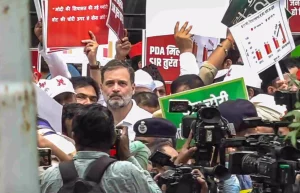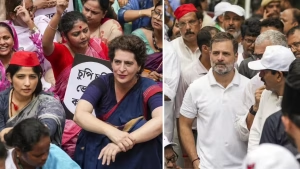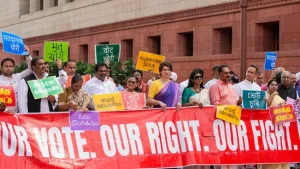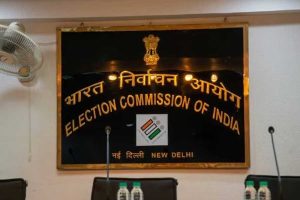New Delhi – The Opposition March To ECI on August 11, 2025, culminated in dramatic scenes as Delhi police detained multiple INDIA bloc Members of Parliament who were leading a protest from Parliament House to the Election Commission of India headquarters. The demonstration focused on challenging the special intensive revision of electoral rolls in Bihar and addressing alleged electoral malpractices that opposition leaders claim threaten democratic integrity.
Leader of Opposition Rahul Gandhi spearheaded the Opposition March To ECI, emphasizing that this protest represented a fundamental fight to preserve constitutional values rather than a mere political demonstration. His leadership of the march underscored the opposition’s commitment to challenging what they perceive as systematic electoral irregularities.
The Opposition March To ECI began at Makar Dwar in Parliament, with MPs from various opposition parties joining forces to present a unified front against alleged electoral misconduct and demand accountability from the Election Commission of India.
Route and Police Intervention Details

The planned Opposition March To ECI route extended from the Parliament House complex to the Election Commission headquarters at Nirvachan Sadan, representing a symbolic journey from the legislative branch to the electoral oversight body. However, the march encountered immediate resistance as protesters approached police barricades strategically positioned to prevent their advance.
Delhi police had prepared comprehensive security arrangements to manage the Opposition March To ECI, erecting multiple barricades and deploying significant personnel to contain the demonstration. These preparations indicated official anticipation of the protest and determination to prevent MPs from reaching their intended destination.
The Opposition March To ECI transformed from a peaceful procession into a confrontational situation when police intervention prevented protesters from continuing their planned route, leading to dramatic scenes of civil disobedience and subsequent detentions.
Dramatic Scenes of Civil Disobedience

The Opposition March To ECI witnessed remarkable displays of determination as several MPs attempted to overcome police barriers through direct action. Trinamool Congress MP Mahua Moitra and Samajwadi Party leader Akhilesh Yadav were observed climbing over police barricades in their attempt to continue the march despite official obstruction.
These dramatic actions during the Opposition March To ECI demonstrated the intensity of opposition commitment to reaching the Election Commission headquarters and presenting their concerns directly to electoral authorities. The willingness of senior MPs to engage in such physical demonstrations underscored the seriousness with which they viewed the electoral issues at stake.
Other participants in the Opposition March To ECI, including Congress President Mallikarjun Kharge, chose alternative forms of protest by organizing sit-in demonstrations at the barricade locations, creating sustained pressure on authorities while maintaining peaceful resistance principles.
Key Participants and Cross-Party Unity


The Opposition March To ECI featured prominent participation from multiple opposition parties, demonstrating remarkable unity across traditional political boundaries. Congress MPs Priyanka Gandhi Vadra and KC Venugopal joined Samajwadi Party MP Dimple Yadav and other INDIA bloc representatives in presenting a coordinated challenge to electoral authorities.
This cross-party participation in the Opposition March To ECI reflected the opposition’s success in building consensus around electoral integrity issues, transcending individual party interests to focus on broader democratic concerns affecting the entire political opposition.
The diverse composition of the Opposition March To ECI participants emphasized the widespread nature of concerns about electoral processes and the shared commitment among opposition parties to challenge perceived irregularities through united action.
Electoral Roll Revision Concerns
The Opposition March To ECI specifically targeted the special intensive revision of electoral rolls in Bihar, which opposition parties claim represents systematic manipulation designed to benefit the ruling party. These allegations form the core justification for the dramatic protest action and detention risks undertaken by participating MPs.
Opposition leaders argue that the Opposition March To ECI was necessitated by the Election Commission’s failure to address legitimate concerns about electoral roll irregularities that potentially affect millions of voters and compromise the integrity of democratic processes in Bihar and potentially other states.
The timing of the Opposition March To ECI coincides with growing opposition criticism of electoral management practices, suggesting broader concerns about the independence and effectiveness of India’s electoral oversight mechanisms.
Also Read: Bihar Deputy CM Vijay Sinha Faces Shocking ECI Notice Over Having 2 Voter ID Cards
Election Commission Response and Scheduled Meeting


Despite the confrontational nature of the Opposition March To ECI, the Election Commission granted an appointment for interaction at 12 noon on the same day, responding to a formal request from the Congress Party. This development suggests institutional willingness to engage with opposition concerns through official channels.
The Election Commission’s decision to schedule a meeting concurrent with the Opposition March To ECI demonstrates recognition of the seriousness of the allegations and the need for formal dialogue between electoral authorities and opposition representatives.
This official response to the Opposition March To ECI provides an alternative avenue for addressing electoral concerns while potentially defusing some of the tension created by the protest and subsequent detentions.
Strategic Planning and Future Actions
Following the Opposition March To ECI and subsequent detentions, Congress President Mallikarjun Kharge announced plans to host MPs for a dinner meeting designed to formulate comprehensive strategy regarding alleged poll fraud issues. This strategic session reflects the opposition’s commitment to sustained action beyond the immediate protest.
The post-Opposition March To ECI strategy meeting indicates that opposition parties view this demonstration as part of a broader campaign rather than an isolated protest event, suggesting continued pressure on electoral authorities and potential escalation of democratic resistance efforts.
These strategic discussions following the Opposition March To ECI demonstrate the opposition’s recognition that addressing electoral integrity concerns requires coordinated, sustained political action across multiple forums and time periods.

